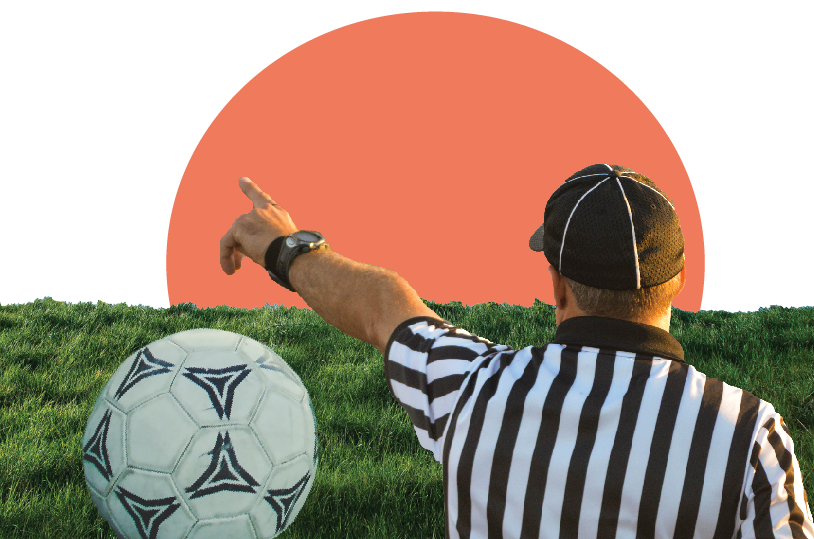Where’s the whistle?
WSS delves into the reasons behind the local shortage of sports officials.
Referees and athletes discuss the benefits and difficulties with reffing today in the Midwest region.
From California to Minnesota, New Hampshire and Indiana, news stories nationwide detail a shortage of officials for various sports at different levels within the past year. Iowa is no exception — a noticeable lack of officials, specifically at the high school level, is prevalent in the state.
Executive Secretary of the Iowa City Athletic Officials Association John Mathias is in charge of assigning officials to junior high and high school football, basketball, baseball and softball games in Iowa City and surrounding towns. Although Mathias cites many reasons for a shortage of officials, one factor sticks out to him in particular — bad sportsmanship.
“With social media, there is so much scrutiny and pressure, and I think we can tend to dehumanize and depersonalize things a little bit too easily sometimes,” Mathias said. “Temperatures get a little hot, and fans, and sometimes coaches or players, can take it too far.”
Jeremy Cohen, a U.S. Soccer referee, referee instructor and referee assignor, also acknowledges that bad sportsmanship is an issue.
“I hear the horror stories; I read the horror stories. Soccer referees love to gossip, especially about the stuff that is amusing, frustrating, problematic,” Cohen said. “So when things don’t go well, especially in terms of coach or spectator behavior, we hear about it.”
West High varsity girls basketball player Lucy Wolf ’24 addresses how she sees many interactions between high school basketball players and referees play out.
“We get very defensive when some play is made on us. I feel like there is a little bit of distance between the players and the refs,” Wolf said. “The refs are just trying to do their job, but also it’s frustrating sometimes because they have control over the game, and I don’t know if players necessarily like that a lot.”
Additionally, Wolf recognizes that fans and parents can play a significant role in the actions of referees.
“I think fans, even my parents, get so into [games]. It definitely does not help when parents are yelling at the refs because then [the referees] just get frustrated with that, and that can sway their calls,” Wolf said.
As a U.S. Soccer referee and a University of Iowa varsity women’s soccer player, college senior Sam Cary understands that players and fans can be frustrated with particular calls. However, Cary feels that not only is certain player and fan behavior unacceptable, but also this scrutiny is unfairly applied to female referees compared to male referees.
“During an [Under-19 men’s] state cup game, a parent didn’t like one of my decisions, and the parent jumped over a fence and started charging at me, screaming ‘I’m gonna get her.’ I think a lot of that’s because I, compared to the [other] people that were reffing, seemed fragile and weak,” Cary said. “I gave a red card at a state cup once because a male player looked me up and down and asked me, ‘Since when are women allowed to be referees?’”
According to Indeed, a worldwide job site based in the U.S., the average base salary for referees in the U.S. is $18.38 per hour. Mathias expresses that the low pay and the required time can be challenging elements of the officiating job.
“People just don’t have much spare time to take on these kinds of activities. Also, I think it’s a little bit of a money issue as well. I don’t officiate for the money, but I certainly wouldn’t do it for free,” Mathias said. “It definitely needs to be worth your time, and people’s time is important to them. Sometimes it’s enough for folks and sometimes it’s not, and that’s a decision that everybody has to make.”
Despite having an officiating job since 1995, Mathias works full time at the University of Iowa College of Pharmacy. Mathias sees the vast majority of high school officials in the area using officiating as a part-time job like him.
“I would say definitely 99% of the time, it’s a side job,” Mathias said. “People who are full-time officials are probably working at the highest level of Division I college basketball, and they’re working 40 nights in a row throughout the winter. They make good money doing that, but it’s a grueling kind of season.”
Eight years ago, as a high school freshman, Cary started refereeing as a flexible way to make money while managing a busy competitive soccer schedule. Cary quickly developed a deep appreciation for the job. She was recognized for her skills as a referee during her senior year of high school when she was picked to be one of twenty people to officiate U.S. Soccer youth nationals. Now, she referees to show other young females that it is an opportunity available to them.
“As a female referee right now, I do it mainly so that the freshmen in high school see that that’s an option — there’s an opportunity to be a female referee, and this isn’t a man’s space,” Cary said.
Mathias’s primary reason for becoming an official centers around his love for sports.
“I’ve always been involved in sports since I was young. I wasn’t very good, but I always enjoyed being around sports,” Mathias said. “When I was in college, I did work a little bit of intramurals, and I found it was an easy way to stay involved with the sports I love.”
Along with wanting to be closer to a game he enjoys watching, Cohen was inspired to become a referee because he wanted to improve the refereeing in his area.
“When I was watching [my kids] play [recreational soccer], I was seeing things happen that I knew didn’t fall within what was allowed, but I didn’t know the exact reason why or the justification. So, I became interested in the rules that govern that sport in particular, and I found out that there was a [referee] course near where I lived,” Cohen said.
While referee training and certification requirements differ from sport to sport, the valuable life lessons learned from refereeing, especially at a young age, remain the same.
“Being a referee at those critical developing moments of my life — when I was developing my confidence, my stature, my posture, my verbal and nonverbal communications — I learned so much from being on the field with the whistle in my mouth than I ever could have with the ball and my foot,” Cary said.
Mathias shares what he wishes others would consider when interacting with referees.
“I think the important thing to remember is that we’re humans just like everybody else, like all the players, coaches and fans, and we’re going to have good days and bad days, and sometimes we’re not going to get it right,” Mathias said. “We hope that you don’t take it personally. We’re just happy to be part of the game with you.”
Your donation will support the student journalists of West High School. Your contribution will allow us to purchase Scholarship Yearbooks, newsroom equipment and cover our annual website hosting costs.

(she/her) Ella De Young is a senior at West. This is her second year on staff working for West Side Story as the print managing editor. When she's not...
Sofia Wells-Lu is a sophomore at West High and this is her first year on staff. She is a photographer for the yearbook and enjoys reading books and listening...




